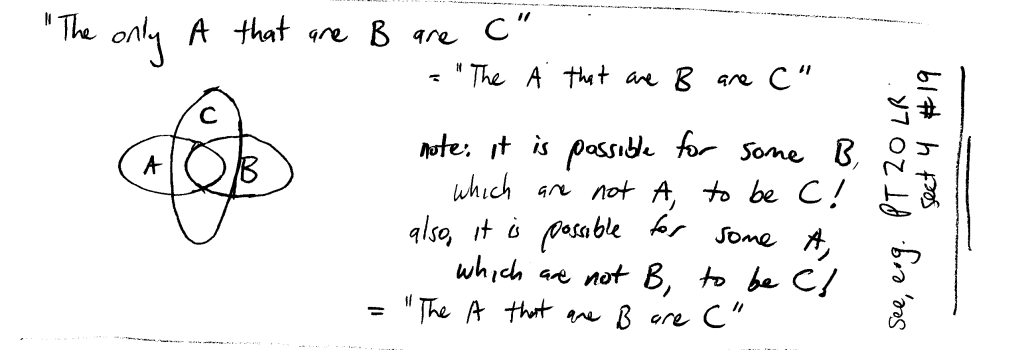http://top-law-schools.com/forums/viewt ... 6&t=110024
Executive summary: I think that believing that the word "only" ALWAYS introduces a necessary condition can cause problems.
SIMPLE:
"Only A are B"
B --> A
"Only a happy person smiles."
smile--> a happy person
In English, what this is saying is that, of the group of B's, only A is in that group. In other words, only A comprises the group of B; all B are A. See:

ADVANCED:
"The only A that are B are C"
A AND B --> C
See:

From PT 45, Sect 4, #22:
"The only preexisting recordings that are transferred onto compact disc are those that record companies believe will sell well enough on compact disc to be profitable."
preexisting recording AND transferred to CD ---> companies believe ...profitable
When you have "THE ONLY," in the English language, "THAT" or "WHICH" or "WHO" often follows, so "the only" will, in these cases, group what immediately follows "A" with something else, viz. "B." In this case, "the only" is very different from "only," in that "the only" now is introducing one of the sufficient conditions.
"The only happy person who smiles is awake."
happy AND smiles --> awake
"The only poisonous parts of an apple are the apple seeds."
part of apple AND poisonous --> apple seeds
SIMILARLY, "THE ONLY" can introduce ONE sufficient condition, though much less commonly so.
"The only 'theZeigs' is a dude."
theZeigs --> a dude
but this is not the same as saying:
"Only ‘theZeigs’ is a dude."
dude --> theZeigs
!!!!
It's important to note also that "THE" or "THIS" CAN encode "ONLY." For example:
The only poisonous parts of an apple are the apple seeds.
part of apple AND poisonous --> seeds
Equivalent to:
The poisonous parts of an apple are the apple seeds.
Furthermore, note that because of "the" before "apple seeds," "only" is also encoded, so the reverse is true:
"Only the apple seeds are the (only) poisonous parts of the apple"
= "The only poisonous parts of an apple are the (only) apple seeds."
apple seeds --> part of an apple AND poisonous
So, note the difference:
"The only happy person smiles."
the happy person --> smiles
"Only the happy person smiles."
smiles --> the happy person
"The A is B." = "The (ONLY) A is B"
A --> B
So clearly, "the" can encode "only" but not vice versa, EDIT: and not necessarily.
the --> only EDIT: MAYBE
The reason why it is not necessarily the case that "the" implies "only" is because "the" can also refer to not a singular object, but a group. The best example is:
"The A are B" is not equal to "Only A are B." They are actually logical reversals of one another (reversing necessary and sufficient conditions).
For another example: "The Sand People are easily frightened." vs. "Only Sand People are easily frightened." Definitely not equivalent.
This is semantic but it has major implications on a test like the LSAT which is so much based on semantics. "The" specifies one, and only one, and thus you can occassionally feed "the" into the discussion above regarding "only." This is pithily summarized in the NBA playoffs slogan: "There can only be one." (If you're the one, there is only one of you, by definition.)
Finally, note the example above:
"The only A's that are B are C"
aka A AND B ---> C
is distinct from
"Only A that are B are C"
Which should be diagrammed.
C --> A AND B.
See:

Furthermore: "The only A's that are B are C" is equivalent to "The A's that are B are C."
So while "the" can encode "only," two consequent "only's" next to each other (i.e. "The only" = "only only") do NOT cancel out. Instead, "the only" means "ALL," and see above thread for further discussion of "ALL, EVERY" and "NO/NONE." To add to that discussion, briefly, here, "ALL" will group the next two things. "All A that are B are C" is diagrammed:
ALL (A that are B) --> C
Also, note again the difference in the most basic statement:
"Only A are B" is distinct from "The only A are B" = "ALL A are B"
So: "The only preexisting recordings that are transferred onto compact disc are those that record companies believe will sell well enough on compact disc to be profitable."
is equal to:
"ALL [preexisting recordings] (that are=AND) [transferred onto compact disc] (are = -->) [those that record companies believe will sell well enough on compact disc to be profitable]."
I think that this summarizes why "flashcards" are not applicable to the LSAT, generally; one who uses a flashcard system would mechanically say that things like "ONLY" MUST introduce a necessary condition, which it does not necessarily!
I hope this helps some people, give me a yell if there are any corrections necessary here.
The take home message is that logical statements containing "ONLY" can be quite tricky and it is worth being familiar with how to diagram various statements with conditional reasoning so that you can save precious seconds on the LSAT.
EDIT: Edited to reflect the fact that "the" doesn't necessarily encode "only"